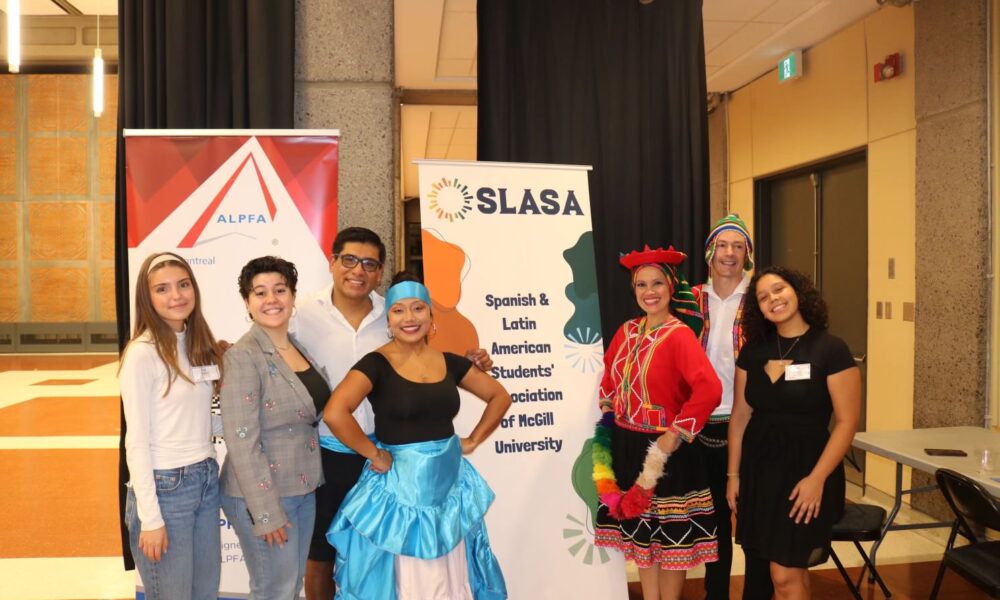In 2018, Quebec’s parliament designated October as Hispanic Heritage Month, and Canada’s parliament recognized it as Latin American Heritage Month. Since then, many organizations and institutions have celebrated the rich cultures and contributions of Latin American and Hispanic communities in Canada. Yet at McGill University—where a diverse student body includes 30 per cent international students, with 599 holding passports from Latin America and Spain—there has been a blatant silence. This figure alone doesn’t account for the diaspora who identify as Latinx or Hispanic and hold other passports. A more accurate number can be achieved by looking at the Spanish and Latin American Students’ Association (SLASA), whose member count reaches over 1,900.
McGill offers two undergraduate programs that focus on Latinx and Hispanic culture, politics, and literature: The Latin American and Caribbean Studies program and the Hispanic Studies program. These provide the university with a wealth of academic resources, from professors and course lecturers to fellow students. Yet, while Dalhousie’s Human Rights and Equity Services wrote a broadcast message on their bulletin with resources and reflections on the importance of uplifting the voices and experiences of Latinx and Hispanic groups, and Toronto Metropolitan University organized a Latin American Heritage Day last year, McGill refuses to tap into its resources. This is a gross oversight considering that the university directly benefits from Latinx and Hispanic knowledge production and culture. Such rich opportunities for proper recognition are clearly at McGill’s fingertips, if not in its grasp.
McGill’s librarians made a first effort in 2021 with a Redpath book display dedicated to Heritage Month, titled “Visions of Latinidad: How they see us and who we are.” The website is still up and has not been updated since. During a quest to find out where the annual display was, a librarian revealed that the ‘theme’ had been changed to Witches this year. This being the only attempt that the university itself makes around Heritage Month makes it all the more disappointing to students who walk through Redpath rightfully hoping to see themselves represented on the shelf, and instead see books on Salem. They could have at least thrown in a book or two on //brujería//. The understanding of Heritage Month and //Latinidad// as a simple theme to be used and displayed (or not) is reflective of McGill’s broader neglect and refusal to recognize marginalized groups.
While McGill’s behaviour is disheartening, it comes as no surprise. The first Black student group at McGill was founded in 1940, and as of 2023, 4.4 per cent of McGill students self-identified as Black on McGill’s student census. However, it took McGill until 2017—10 years after the Quebec government legally recognized February as Black History Month—to host an official celebration. With similar numbers of Latinx/Hispanic students (4.7 per cent), and SLASA being founded in 1989, Latinx and Hispanic students at McGill should not expect to wait until 2028, or longer, for recognition.
With nowhere left to turn, McGill’s Latinx and Hispanic student body is made to rely on student groups such as SLASA and the Caribbean and Latin American Studies and Hispanic Studies Students’ Association (CLASHSA) for representation, events, information, and celebration. Student groups—consisting mostly of full-time undergraduates volunteering their time—put immense effort into organizing Latin American and Hispanic Heritage Month events. The simple act of acknowledgement and support from McGill could greatly reduce this level of labour.
McGill is at a crossroads, with so many vibrant resources growing within its walls, and a future full of Latinx and Hispanic students who will become graduates of one of the most renowned Canadian universities and leaders in several fields. The administration’s lack of action during Latin American and Hispanic Heritage Month is a missed opportunity both for its own enrichment and for the elevation and inspiration of brilliant voices that would speak louder if they were afforded representation.









